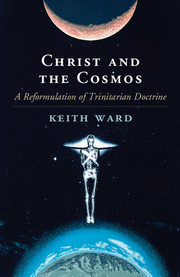Book contents
- Frontmatter
- Contents
- Preface
- Acknowledgements
- PART I THE THREEFOLD NATURE OF THE DIVINE BEING
- PART II THE BIBLICAL SOURCES OF TRINITARIAN THOUGHT
- PART III THE TRINITY, IMMANENT AND ECONOMIC
- PART IV THE SOCIAL TRINITY
- 22 Persons and Substances
- 23 The Idea of a Personal and Free Creation
- 24 The Logical Uniqueness of Persons
- 25 The Divine Nature and Freedom
- 26 Freedom in God and in Creatures
- 27 Persons as Necessarily Relational
- 28 An Ontology of the Personal?
- 29 Intra-Trinitarian Love
- 30 Infinite Gods
- 31 Divine Love and Necessity
- 32 Love and Alterity
- 33 Trinity versus Monotheism
- 34 The Passion of Christ
- 35 God and Abandonment
- PART V THE COSMIC TRINITY
- Bibliography
- Subject Index
- Name Index
23 - The Idea of a Personal and Free Creation
from PART IV - THE SOCIAL TRINITY
Published online by Cambridge University Press: 05 September 2015
- Frontmatter
- Contents
- Preface
- Acknowledgements
- PART I THE THREEFOLD NATURE OF THE DIVINE BEING
- PART II THE BIBLICAL SOURCES OF TRINITARIAN THOUGHT
- PART III THE TRINITY, IMMANENT AND ECONOMIC
- PART IV THE SOCIAL TRINITY
- 22 Persons and Substances
- 23 The Idea of a Personal and Free Creation
- 24 The Logical Uniqueness of Persons
- 25 The Divine Nature and Freedom
- 26 Freedom in God and in Creatures
- 27 Persons as Necessarily Relational
- 28 An Ontology of the Personal?
- 29 Intra-Trinitarian Love
- 30 Infinite Gods
- 31 Divine Love and Necessity
- 32 Love and Alterity
- 33 Trinity versus Monotheism
- 34 The Passion of Christ
- 35 God and Abandonment
- PART V THE COSMIC TRINITY
- Bibliography
- Subject Index
- Name Index
Summary
Some difficult questions unavoidably arise about Zizioulas’ concept of both human and divine personhood. One is the sharp contrast made between the concepts of ‘substance’ and ‘nature’ on the one hand and ‘person’ and ‘relation’ on the other. Zizioulas says that the concept of ‘person’ is logically prior to the concept of ‘substance’. But this seems a very odd contrast to make. If a primary substance is an individual thing of a specific nature, then a person is obviously a substance. Human persons, anyway, are individuals, substances who are conscious, who think abstractly and act freely (or so it seems to them). They are centres of creatively free acts. There is no reason that all substances should be, as Zizioulas describes them, self-contained, isolated, impersonal, and unconscious. In fact, many of them very obviously are not. The individual substances who are human persons are conscious, importantly related to other persons, and dynamic. So it is not true that persons, as such, are to be distinguished from substances. Some substances will be conscious, intelligent, and free (will be persons), and their nature will precisely include being dynamic, changing, creative, temporal, and relational. It is very misleading, then, to suggest that ‘persons’ are ontologically prior to ‘substances’. But it is not at all misleading to hold that conscious, knowing, and willing substances are not reducible to and are ontologically prior to impersonal, unconscious, and inactive substances.
The United Reformed theologian Colin Gunton agrees with Zizioulas that there has been ‘a paradigm shift from natures to persons, from substance metaphysics to a metaphysics of relations’ (Gunton, 1995, p. 141). He holds that ‘the inner relations of God are free and that God is ‘a personal taxis of dynamic and free relations’ (Gunton, 1995, p. 100), not a necessitarian, substantialist, and static being.
The opposition of ‘nature’ and ‘person’ is interesting, and it does mark a change in conceptions of God, though not necessarily in an ‘immanent three-consciousness’ direction. It is true that the traditional concept of the divine nature in Latin Christianity was dependent on the philosophy of Aristotle. Aristotle's God was a perfect self-contemplating, changeless, and non-temporal being.
- Type
- Chapter
- Information
- Christ and the CosmosA Reformulation of Trinitarian Doctrine, pp. 151 - 154Publisher: Cambridge University PressPrint publication year: 2015



